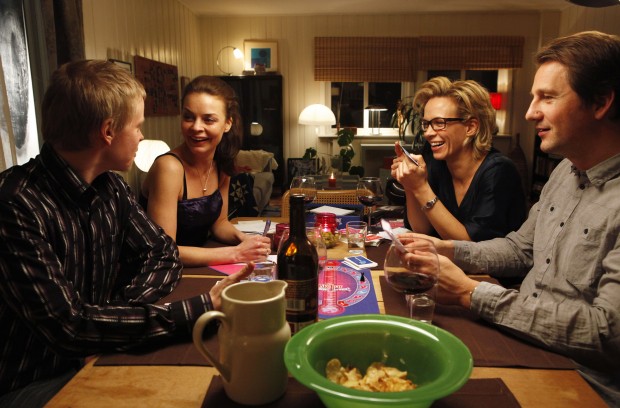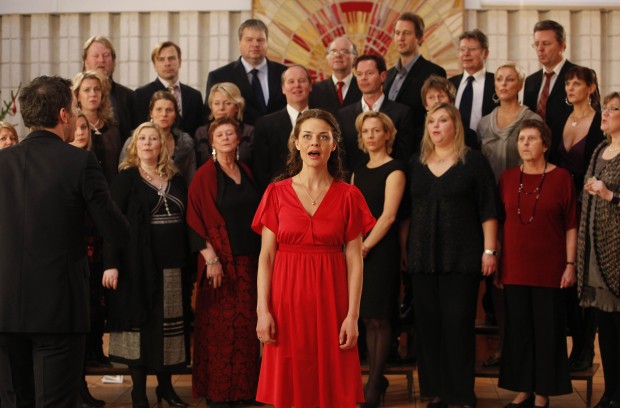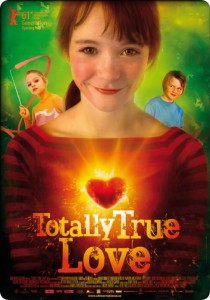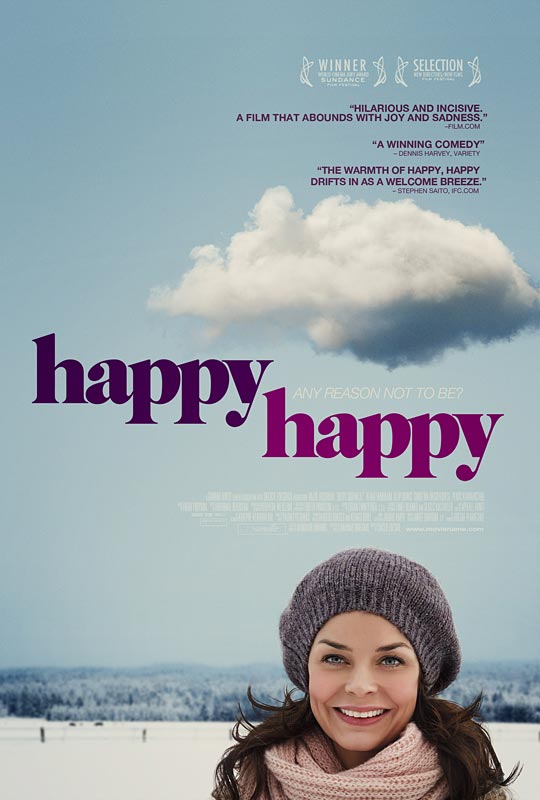
Happy Happy, the debut film by Norwegian director Anne Sewitsky, has been having one outstanding year. After scoring with critics and audiences in its native Norway, this character-driven comedy earned acclaim at Sundance, where it took home the World Cinema Grand Jury Prize, before being featured in the Film Society of Lincoln Center’s New Directors New Films festival, which has discovered such thrilling filmmakers as Pedro Almodovar, Darren Aronofsky, Kelly Reichardt and Guillermo Del Toro. And now, just days before it opens in limited release here in the States, this chipper dark comedy has been submitted to the Academy Awards as Norway’s entry for Best Foreign Language Film, meaning you could (and should) be hearing much more about this little Dogme gem in the coming months.
Happy Happy centers on Kaja, a wife and mother who always looks on the bright side of life, no matter how bleak things may seem. But when the chic and sophisticated “perfect couple” moves in next door with their adorable adopted Ethiopian son, Kaja soon finds a new path to happiness. Though it deals with themes of betrayal, abuse, repression and infidelity, Happy Happy is a lithe and thoroughly funny comedy about relationships and sexual discovery. And as it was my favorite film out of NDNF (check out my review), I was eager to speak with Happy Happy’s director, Anne Sewitsky about the film, its music and what’s next.

TFS: First off congratulation on all the acclaim that Happy Happy is receiving.
Sewitsky: Thank you.
Happy Happy seems universal in themes, but is quite specific in its details. Is there anything within the film you worry won’t translate to American audiences?
When we came to Sundance we were worried about how the humor would work…Humor is very difficult, to see if it’s very Nordic humor or [something more inclusive]. But we were very surprised and very happy to see people [in the Sundance audience] were laughing at the same places [Norwegian audiences had] and also that the American audience took to the drama very well.
But there is one scene in the film that Americans don’t understand. The German scene.
Yes, where two of the characters argue in German so the children can’t follow.
In Norway that’s the most hilarious scene; in the States it’s a very serious scene. Everyone in Norway also studies German in school, so [the crux of the humor in that scene is reliant on] wordplay and wrong sentences and a mixture of English and German that they’re saying in the wrong way, and it’s kind of hilarious. But that’s one scene that in the States [doesn’t totally translate.]
There’s also a troubling subplot in the film involving the two boys, one white the other black, who play “Slavery.” Can you talk about your intentions for this subplot?
We wanted the children to be a symbol of how the grown-ups were too obsessed with their own lives and their own conflicts that they are forgetting their children. Then we wanted the children to kind of have their own theme, not being interrupted by the grown-ups. Things like children are children; they are cruel to each other. They do horrible things — without that being something really dangerous. Like, I rolled my sister up in a carpet once and we did ”the look” at home – but it wasn’t that dangerous. They are cruel to each other but it becomes more horrible when we as an audience see it as a result of how the grown-ups are acting. But [the boys] don’t know [the implications of] what they’re doing themselves.

Yeah, it’s interesting to see how it plays out — especially towards the end. Your film has a dark sense of humor but a light tone, something I’ve noticed within a few films coming out of Norway. Do you feel this brand of humor is uniquely Norwegian?
The tone is probably Norwegian or perhaps Scandinavian, the way of being very light on very dark themes and having to humor them up. We don’t necessarily talk about these feelings.
Another standout element of Happy Happy is the use of music in the film. There’s a series of appearances by a quartet of singers, who sing in English, donning suits and addressing the camera directly. They are separate from the narrative, but comment on it like this surreal Greek chorus. Could you tell us how this came to be?
Well, one of the main themes in the film is how you’re kind of enslaved by your own life. Then when we incorporated in the Ethiopian child — [adopting Ethiopian children in Norway is very common] — and the playing slavery scenes, then we looked to Negro spirituals [for inspiration] and found these funny clips from the ’30s. Also we always intended to have kind of chapters with an outside voice commenting about that directly…and we wanted to have this contrast of the serious drama and this thing that seems happy but is not so happy.
Were those men a band already or were they put together for the film?
They were put together specifically for this film. They are people I know through the music director. But they are now a band, now they’re traveling around!
 After Happy Happy, which is pretty adult in content and sense of humor, you helmed the kid’s movie Totally True Love about a 9 ½ year-old’s first flirtation with love. How was it making this switch?
After Happy Happy, which is pretty adult in content and sense of humor, you helmed the kid’s movie Totally True Love about a 9 ½ year-old’s first flirtation with love. How was it making this switch?
Well [Totally True Love] was based on one my favorite books when I was 10, so I think — like all girls and boys in Norway — I have really strong feelings about the book that was kind of magical and says something in a very serious way about children falling in love. In huge contrast to Happy Happy, but brought a lot of the crew over from that film and worked sort of parallel on both films so it was kind of nice to work on something so different from each other. And for that film we had a not less-is-more but more-is-more [approach, and were able to do] everything we wanted to do. While Happy Happy was kind of a smaller Dogme film, this was kind of a do everything film. It was huge transition, just something very different.
View the trailer for Totally True Love here.
Now you mentioned Dogme. You attempted to make your film by Dogme rules. Can you tell us about that?
Well there’s some [Dogme-based] Norwegian rules from a company in Norway (Maipo Film- og TV Produksjon). They made a film by the rules before and we were kind of the second film. And it was about working within certain restrictions: that we wrote the script for fewer locations, fewer actors, 20 days of shooting and a much lower budget. And it was supposed to be as short a time as possible from script to shooting. But we ended up spending a lot of time writing the script. And we broke the rules the whole time, but it was nice to have something so compressed and having some [guidelines] to follow.
I’ve heard that your mother is Norwegian, but your father is American. How did that affect your perception of film growing up? Were you exposed to a lot of American cinema? What films or filmmakers most inspire you personally?
I saw a lot of film when I was growing up and mainly American cinema.…For each film [I make], I find new directors and new films that inspire me. So I don’t have kind of one leading director who inspires me, but from when I was younger it was E.T. and Spielberg and David Lynch, and now it’s more kind of Amelie and more and more independent films. I tend to jump in very different directions.
Are there plans to release Totally True Love in the U.S.?
I’m not quite sure. The life of [that film] has kind of started now [that it has opened in Norway]. I think there are plans for doing [international] sales.
Scandinavian cinema has been drawing notice recently here in the States, from The Girl With the Dragon Tattoo to Troll Hunter – both of which are getting American remakes. Has there been any talk of Happy Happy getting and English-language remake?
Yes I think they’re in final negotiations on a remake. So someone has now landed [the rights to] the remake. I can’t give out the name of it. But it’ll probably be announced soon.
Do you have any interest in making movies in America?
I would love to if it was the right project.
Well thank you for your time, hopefully we’ll hear more from you come Oscar time!
Thank you.

Happy Happy open ins NY and LA Friday, September 16.
And look for its memorable soundtrack on i-Tunes in the coming weeks.

